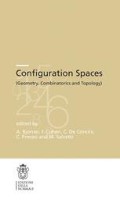Abstract
The present work is a user’s guide to the results of [7], where a description of the space of characters of a quasi-projective variety was given in terms of global quotient orbifold pencils.
Below we consider the case of plane curve complements. In particular, an infinite family of curves exhibiting characters of any torsion and depth 3 will be discussed. Also, in the context of line arrangements, it will be shown how geometric tools, such as the existence of orbifold pencils, can replace the group theoretical computations via fundamental groups when studying characters of finite order, specially order two. Finally, we revisit an Alexander-equivalent Zariski pair considered in the literature and show how the existence of such pencils distinguishes both curves.
Access this chapter
Tax calculation will be finalised at checkout
Purchases are for personal use only
Preview
Unable to display preview. Download preview PDF.
References
A. Adem, J. Leida and Y. Ruan, “Orbifolds and Stringy Topology”, Cambridge University Press. 2007.
D. Arapura, Geometry of cohomology support loci for local systems I, J. of Alg. Geom. 6 (1997), 563–597.
E. Artal, Sur les couples de Zariski, J. Algebraic Geom. 4 (1994), 223–247.
E. Artal, J. Carmona and J. I. Cogolludo, Essential coordinate components of characteristic varieties, Math. Proc. Cambridge Philos. Soc. 136 (2004), 287–299.
E. Artal, J. Carmona, J. I. Cogolludo and M.Á. Marco, Invariants of combinatorial line arrangements and Rybnikov’s example, Singularity theory and its applications, Adv. Stud. Pure Math., vol. 43, Math. Soc. Japan, Tokyo, 2006, pp. 1–34.
E. Artal and J. I. Cogolludo, On the connection between fundamental groups and pencils with multiple fibers, J. Singul. 2 (2010), 1–18.
E. Artal, J. I. Cogolludo-Agustín and A. Libgober, Depth of cohomology support loci for quasi-projective varieties via orbifold pencils, J. Reine Angew. Math., to appear, also available at arXiv:1008.2018 [math.AG].
E. Artal, J. I. Cogolludo-Agustín and D. Matei, Characteristic varieties of quasi-projective manifolds and orbifolds, Preprint available at arXiv:1005.4761v2 [math.AG], 2010.
E. Artal, J. I. Cogolludo and H.O. Tokunaga, A survey on Zariski pairs, Algebraic geometry in East Asia—Hanoi 2005, Adv. Stud. Pure Math., vol. 50, Math. Soc. Japan, Tokyo, 2008, pp. 1–100.
G. Barthel, F. Hirzebruch and T. Höfer, “Geradenkonfigurationen und Algebraische Flächen”, Friedr. Vieweg & Sohn, Braunschweig, 1987.
J. I. Cogolludo-Agustín and A. Libgober, Mordell-Weil groups of elliptic threefolds and the Alexander module of plane curves, Preprint available at arXiv:1008.2018v2 [math.AG], 2010.
J. I. Cogolludo-Agustín and M.Á. Marco Buzunáriz, The Max Noether fundamental theorem is combinatorial, Preprint available at arXiv:1002.2325v1 [math.AG], 2009.
J. I. Cogolludo and V. Florens, Twisted Alexander polynomials of plane algebraic curves, J. Lond. Math. Soc. (2) 76 (2007), 105–121.
D. C. Cohen and A. I. Suciu, Characteristic varieties of arrangements, Math. Proc. Cambridge Philos. Soc. 127 (1999), 33–53.
A. Dimca, Pencils of plane curves and characteristic varieties Preprint available at math.AG/0606442, 2006.
A. Dimca, S. Papadima and A.I. Suciu, Formality, Alexander invariants, and a question of Serre, Preprint available at arXiv:math/0512480v3 [math.AT], 2005.
D. Eisenbud, “Commutative Algebra. With a View Toward Algebraic Geometry”, Graduate Texts in Mathematics, Vol. 150. Springer-Verlag, New York, 1995.
M. Falk, Arrangements and cohomology, Ann. Comb. 1 (1997), 135–157.
R. Friedman and J. W. Morgan, “Smooth Four-manifolds and Complex Surfaces”, Ergebnisse der Mathematik und ihrer Grenzgebiete (3) [Results in Mathematics and Related Areas (3)], vol. 27, Springer-Verlag, Berlin, 1994.
E. Hironaka, Abelian coverings of the complex projective plane branched along configurations of real lines, Mem. Amer. Math. Soc. 105 (1993), vi+85.
W. Magnus, A. Karrass and D. Solitar, Combinatorial group theory, second ed., Dover Publications Inc., Mineola, NY, 2004, Presentations of groups in terms of generators and relations.
A. Libgober, On the homology of finite abelian coverings, Topology Appl. 43 (1992), 157–166.
A. Libgober Characteristic varieties of algebraic curves, Applications of algebraic geometry to coding theory, physics and computation (Eilat, 2001), Kluwer Acad. Publ., Dordrecht, 2001, pp. 215–254.
A. Libgober, Non vanishing loci of Hodge numbers of local systems, Manuscripta Math. 128 (2009), 1–31.
A. Libgober and S. Yuzvinsky, Cohomology of local systems, Arrangements—Tokyo 1998, Kinokuniya, Tokyo, 2000, pp. 169–184.
M. Oka, Alexander polynomial of sextics, J. Knot Theory Ramifications 12 (2003), 619–636.
M. Sakuma, Homology of abelian coverings of links and spatial graphs, Canad. J. Math. 47 (1995), 201–224.
P. Scott, The geometries of 3-manifolds, Bull. London Math. Soc. 15 (1983), 401–487.
C. Simpson, Subspaces of moduli spaces of rank one local systems, Ann. Sci. Scuola Norm. Sup. (4) 26 (1993), 361–401.
A.I. Suciu, Fundamental groups of line arrangements: enumerative aspects, Advances in algebraic geometry motivated by physics (Lowell, MA, 2000), Contemp. Math., vol. 276, Amer. Math. Soc., 2001, pp. 43–79.
A.I. Suciu, Translated tori in the characteristic varieties of complex hyperplane arrangements, Topology Appl. 118 (2002), no. 1-2, 209–223, Arrangements in Boston: a Conference on Hyperplane Arrangements (1999).
H. O. Tokunaga, Some examples of Zariski pairs arising from certain K 3 surfaces, Math. Z. 227 (1998), no. 3, 465–477.
O. Zariski, On the problem of existence of algebraic functions of two variables possessing a given branch curve, Amer. J. of Math. 51 (1929).
Editor information
Rights and permissions
Copyright information
© 2012 Scuola Normale Superiore Pisa
About this paper
Cite this paper
Bartolo, E.A., Cogolludo-Agustín, J.I., Libgober, A. (2012). Characters of fundamental groups of curve complements and orbifold pencils. In: Bjorner, A., Cohen, F., De Concini, C., Procesi, C., Salvetti, M. (eds) Configuration Spaces. CRM Series. Edizioni della Normale, Pisa. https://doi.org/10.1007/978-88-7642-431-1_5
Download citation
DOI: https://doi.org/10.1007/978-88-7642-431-1_5
Publisher Name: Edizioni della Normale, Pisa
Print ISBN: 978-88-7642-430-4
Online ISBN: 978-88-7642-431-1
eBook Packages: Mathematics and StatisticsMathematics and Statistics (R0)

